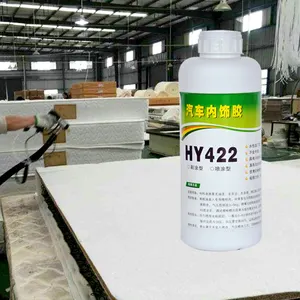

GP Silicone Sealant Acetoxy Gap Filler Waterproof Silicone Adhesive Glue For Glass And Aluminium OEM Available


Neoprene Water Based Glue Contact Spray Adhesive Glue Bonding Sponge Eva Sofa Foam Mattress Adhesive Contact Adhesive Glue
























Acrylic resin adhesive is distinguished by its robust bonding capabilities and adaptability. This adhesive is synthesized from a family of thermoplastic and thermosetting polymers based on acrylic acid, methacrylic acid, and their derivatives. Acrylic epoxy adhesives and their variations are extensively employed across diverse sectors for their superior adhesion, transparency, and resistance attributes.
Exploring the range of acrylic resin adhesives, one encounters a variety of formulations each designed for particular uses. For example, acrylic epoxy adhesives are celebrated for their robustness and longevity, ideal for demanding applications that necessitate high tensile strength. Conversely, paraloid b72 adhesive is esteemed in conservation for its reversible nature and is prevalently used in artifact restoration. Food-grade acrylic resin adhesives are engineered to meet rigorous safety protocols, certifying their suitability for food packaging and utensils. Each acrylic resin adhesive variant presents distinct features, such as differential curing times, viscosity levels, and resilience to environmental conditions, enabling firms to choose the optimal solution for their specific requirements.
The intricate structure of acrylic resin adhesive is crafted to maximize bonding efficiency. At a microscopic scale, the adhesive forms a complex network that deeply penetrates substrates, ensuring a solid mechanical lock upon curing. This structure is bolstered by components like stabilizers, which preserve the adhesive's uniformity; hardeners, which trigger the curing process; and plasticizers, which impart flexibility to the final bond. The synchronized action of these elements guarantees a steadfast and enduring bond, with hardening agents reacting to ambient moisture or a catalyst to consolidate the adhesive and firmly join the materials.
The constituents of acrylic resin adhesive are selected for their bonding efficacy and compatibility with a broad spectrum of substrates. Silicones contribute flexibility and thermal resistance, while pure epoxies enhance the bond's strength and chemical resilience. Polyurethane resins introduce toughness and endurance. These components are chosen not only for their individual merits but also for their synergistic effect in creating a superior adhesive. The outcome is a product capable of withstanding stress, resisting environmental degradation, and securing a durable bond across diverse materials.
Within the commercial sphere, acrylic resin adhesive has proven indispensable. The transportation sector utilizes it to affix vehicle components that endure significant stress and variable climatic conditions. Woodworkers value its clear finish and resistance to discoloration, which is vital for preserving the aesthetics of fine furniture. In the electronics industry, the adhesive's insulating properties ensure safety in securing components. These adhesives have added value by facilitating the creation of more robust, dependable products and by simplifying repair processes that prolong the lifespan of valuable machinery.
The fundamental role of acrylic resin adhesive is to bond two surfaces with a durable connection. It is tailored to fulfill specific tasks such as gap-filling, surface protection, and withstanding environmental elements like moisture and UV radiation. The adaptability of this adhesive enables its application in a wide array of tasks, ranging from straightforward domestic repairs to intricate industrial fabrication processes.
Key attributes of acrylic resin adhesives encompass their swift bonding time, which bolsters efficiency in production workflows, and their capacity to establish robust bonds with minimal surface preparation. These adhesives also exhibit a high degree of pliability, preventing fractures under duress. The transparent finish of many acrylic adhesives is a notable advantage, particularly in consumer products where visual appeal is paramount.
The advantages of employing acrylic resin adhesive are manifold. It addresses the challenge of joining disparate materials, thereby unlocking new design possibilities across various sectors. Users can anticipate a bond that withstands weathering and aging, resulting in products with enhanced longevity and reduced upkeep. The simplicity of application and rapid bonding it offers translate into heightened productivity and economic savings.
Effective utilization of acrylic resin adhesive entails proper surface preparation, accurate application, and sufficient curing time. Surfaces must be clean and moisture-free, and the adhesive should be applied as recommended, whether by brushing, spraying, or nozzle dispensing. Selecting the appropriate acrylic adhesive is critical and hinges on the materials to be joined and the conditions they will encounter. For cleaning, employ solvents prescribed by the manufacturer, and for upkeep, conduct regular inspections to assure the bond's integrity.
The intended users for acrylic resin adhesive span a broad spectrum, from DIY hobbyists to industrial producers. Each variant of the product caters to the distinct demands and preferences of its audience, whether it's a non-toxic adhesive for home repairs or a robust glue for automotive assembly. By recognizing the specific needs of each market segment, producers of acrylic resin adhesives can customize their offerings to precisely satisfy their customers' requirements.
Acrylic resin adhesive is eminently suited for outdoor use, thanks to its resistance to weathering, UV radiation, and temperature shifts. Its durable composition ensures that the bond remains secure even in the most challenging outdoor settings, making it an excellent choice for outdoor furnishings, signs, and vehicle repairs.
Indeed, acrylic resin adhesives are acclaimed for their proficiency in bonding disparate materials. Their formulation accommodates flexibility and expansion, allowing for different thermal movements, which is essential when joining materials such as metal to plastic or wood to metal.
When handling acrylic resin adhesive, safety precautions include operating in a well-ventilated space, donning protective gloves and eyewear, and adhering to the manufacturer's instructions. It is also crucial to use food-grade acrylic resin for applications involving food contact to avert contamination.
Finding the ideal acrylic resin adhesive for your commercial needs is streamlined with Alibaba.com's extensive assortment, serving various sectors and applications. Whether you need a robust bond for transport purposes or a transparent finish for woodworking projects, Alibaba.com connects you with vendors offering adhesives that align with your specifications.